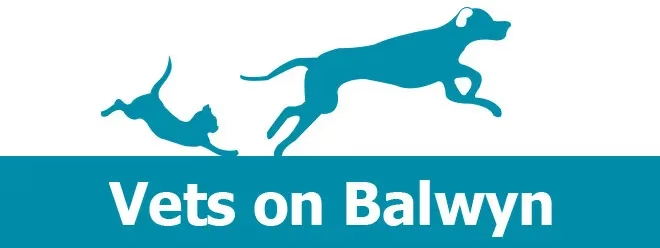Dog Dental Services
Keeping your dog’s teeth and gums healthy is crucial for their well-being. At Vets on Balwyn, we offer comprehensive dental care tailored to your furry friend. From routine dental cleanings to treatments, our expert team is dedicated to ensuring your dog enjoys a lifetime of healthy smiles. Trust us to provide gentle, effective care that supports your dog’s dental health and oral hygiene at every stage of life.
Signs of dental disease in dogs include:
- Swollen, red gums (gingivitis)
- Bad breath caused by bacteria in the mouth
- Foul breath
- Discoloured teeth
- Loose teeth
- Excessive salivation
- Reluctance to eat hard food or chew
- Swelling of the face
- Changes in behaviour (aggression, changes in sleep patterns)
So, how can I care for my dog’s dental health?
1. Daily Chewing
Encourage your dog to chew daily for at least 5 minutes to help mechanically clean their teeth. Options include dental diets, specially designed chews, raw hides, and pigs’ ears.
2. Avoid Bones
Do not feed your dog bones. Cooked bones can splinter and cause severe internal damage, while raw bones can lead to pancreatitis or digestive issues
3. Dental Diets
Hills Science Diet T/D is recommended for daily use as part of your dog’s diet. It’s designed to reduce tartar and calculus buildup.
4. Tooth Brushing and Mouth Rinses
Brushing your dog’s teeth, particularly from a young age, is the gold standard of home care. Use dog-specific toothpaste and soft brushes. Antibacterial mouth rinses are also recommended to reduce bacteria that cause bad breath and periodontal disease.
5. Plaque Off and Water Additives
Plaque Off, a seaweed-based powder, helps prevent plaque buildup when added to your dog’s food. Water additives can also help neutralise bacteria growth in your dog’s mouth, but always provide fresh water alongside.
6. Veterinary Dental Cleaning
Regular professional dental cleanings by a vet can prevent irreversible dental disease and tooth loss, and remove infected or damaged teeth that cause pain. As part of your dog’s regular health assessments provided at Vets on Balwyn, your vet may recommend a professional dental scale and polish to:
- Prevent the onset of irreversible dental disease and tooth loss; and
- To extract infected and damaged teeth that might be causing your dog pain
Vets on Balwyn utilise dental X-rays, advanced ultrasonic cleaning equipment, and other facilities to provide the best dental care for your dog. After an ultrasonic clean is performed, the team at Vets on Balwyn will formulate a dental care plan tailored to your dog’s needs.

Need an appointment?
When your pet’s unwell, or it’s time for a general check-up or vaccination, your furry friend is in good hands. Book online to see our expert Vets on Balwyn!
Contact Details
Opening Hours
Monday – Friday: 8am – 7pm
Saturday: 9am – 2pm
Sunday: Closed
Vets on Balwyn Feedback
EXCELLENTTrustindex verifies that the original source of the review is Google. What an outstanding experience I have had at Vets on Balwyn.! Super easy online booking, wonderful and warm reception staff in clean and calm environment. I saw Vivienne Tan who was so lovely, compassionate and understanding of my hyper anxious Jack Russell and she was gentle, kind, friendly and very patient with him. There was no pressure to rush my consultation and she offered so many solutions and great advice. I have been a pet owner for many years and this was truly a unique and exceptional experience. I highly recommend this practice to everyone. They have a client for life.Posted onTrustindex verifies that the original source of the review is Google. A great Vet clinic with very friendly and professional staff. We wouldn't take our cats anywhere else.Posted onTrustindex verifies that the original source of the review is Google. Truly one of the best vet clinics — if not the best. We are so incredibly grateful to the amazing team here. A heartfelt thank you to Dr. Michelle and Dr. Vivienne — words can’t fully express how much we appreciate everything you’ve done for our beloved kitties, Leon and Luna. You’ve treated them with such kindness, patience, and genuine compassion. You're not only knowledgeable but also incredibly honest, which we deeply value and respect. Knowing our cats are in such caring and trustworthy hands gives us so much peace of mind. And not to forget the wonderful nurses and support staff — every single one of you has been so warm, welcoming, and understanding. You’ve helped create such a comforting, positive environment, and we always feel supported and cared for during every visit. Even though the clinic is a bit of a drive, especially during peak hours, it’s always worth the trip — because we know our fur babies are getting the best care possible. From the bottom of our hearts, thank you. We wholeheartedly recommend this amazing team to anyone looking for vets who are not only skilled but genuinely, honestly care.Posted onTrustindex verifies that the original source of the review is Google. Awesome staff and helpful team. Vet Dr Michelle was amazing. I would take my Malinois anywhere else.Posted onTrustindex verifies that the original source of the review is Google. Dr Kevin and the team at Vets on Balwyn and Vets on Parker have looked after my fussy fur babies (x3) for 10+ years. Dr Kevin is compassionate and I trust him with their care both in life and euthanasia. Wouldn’t go anywhere else.Posted onTrustindex verifies that the original source of the review is Google. Excellent veterinary service. Dr Campbell clearly passionate about delivering high standard of care.Posted onTrustindex verifies that the original source of the review is Google. Vets on Balwyn has been looking after Samson for about 10 years now. All the staff, nurses and vets, are courteous, responsive and professional. Thank you all for your great service all these years. My special thanks to Dr Vivienne who is very knowledgeable, caring , patience and professional. We are very grateful to you for your excellent care provided to Samson.Posted onTrustindex verifies that the original source of the review is Google. A very caring and professional team at Vets in Balwyn. We visited Dr Michelle Rasool today and she was very patient and encouraging with my little dog, who is reactive when going to the vets. Dr Rasool is very experienced and explained everything as we went along so I understood and this will help with future visits. Im very pleased with our visit today.
FAQs
Can my dog’s teeth be cleaned without anaesthesia?
Teeth cleaning (including a dental examination and X-rays to assess the roots of the teeth) can only be carried out under anaesthetic). This ensures your dog’s safety and comfort during the procedure.
How much will it cost to have my dog’s teeth cleaned?
Dental health in dogs is assessed on a scale of 0 to 4. The cost of cleaning your dog’s teeth varies depending on factors like:
- the severity of gum disease,
- the level of tartar buildup, and
- the potential need for tooth extraction due to damage.
To get an estimate of costs, book an appointment with one of our veterinarians.
How often should I have my dog’s teeth cleaned?
Dental checks and daily home care are crucial for maintaining oral hygiene. Typically, dental check-ups once every 6 months are advised. But, the timing of these cleanings varies based on factors such as age, breed, existing dental conditions and how well they respond to home care. Our veterinarians can offer personalised recommendations tailored to your furry friend.
My dog has a broken tooth. What should I do?
If your dog has a broken tooth, contact Vets on Balwyn to schedule an examination and appropriate treatment. Broken teeth can be painful and may lead to infection if left untreated.

